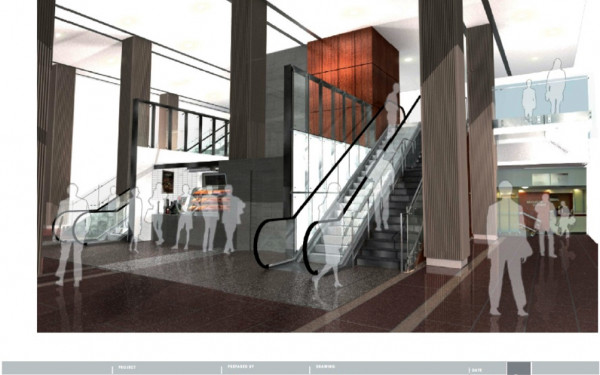CSU Co-Op Plans Delayed Amid Insults and Infighting
Union At Loggerheads Over Replacing Java U Café
While the Concordia Student Union is no stranger to arguing among its members, last Wednesday’s special council meeting set a new standard for infighting for this year’s crop of executives and councillors.
The argument in question stemmed from a motion that would’ve seen an assessment of the CSU’s finances done to determine the funding available for a student-run food co-operative to replace the Java U café located on the Hall Building’s mezzanine. Problems arose when deciding who would oversee the project.
An amendment to task CSU VP Finance Scott Carr with overseeing the assessment was challenged by VP Sustainability Ben Prunty, who told council he wanted CSU General Manager Robert Henri in charge of the undertaking in order to quash any potential bias.
“To be clear, the [motion without my amendment] could have easily been used as an excuse to exclude necessary interested parties from the legal deliberations, and very plausibly this would have been to the detriment of the democratic process,” Prunty told The Link in an email on Monday.
According to Prunty, keeping things in the hands of the GM—who answers only to the CSU president—will limit any bias against a co-op initiative in the Java U space.
The co-op initiative has faced its share of opposition and criticism since it began as a petition last semester. The results of an October referendum where students voted on whether to support the creation of a co-op—which passed overwhelmingly with about 80 per cent support—was challenged by CUSAcorp, the CSU’s for-profit arm, which manages and leases the Java U space.
The CSU Judicial Board voted in November that the results of referenda were binding and that CUSAcorp can be directed by the CSU towards a unilateral decision.
Last week’s special council meeting saw the CSU’s referendum oversight committee present recommendations for establishing the food co-operative, prompting the motion for the financial needs assessment.
Prunty objected to having Carr—also the president of CUSAcorp—in charge of the assessment, which multiple members of council called an “insult” to Carr.
“It kinda makes sense to get the VP Finance to write a financial assessment,” wrote Carr over Twitter. “Not going to lie, but kinda insulting.”
Executive Conflict
Prunty maintains his amendment was only to ensure the CSU followed through on the mandate given to them by students.
“As one of the only people at council to have sat through both of the CUSAcorp Board’s […] attempts to subvert the successful petition process despite the fact that it was 100 per cent in keeping with the CSU’s bylaws […] I am very aware of just how far biases can manifest themselves in legal matters when dealing with this question specifically,” said Prunty.
“I have been the informal primary contact point between the CSU and the petitioners and I’ve alerted the petitioners in the past, and will continue to alert them as well as the rest of the student body when the democratic process is not being respected as fully as it needs to be,” he continued.“Good governance is paramount to a functioning student union.” But Carr also has his share of criticism for Prunty.
“I think the suggestions brought forward by Mr. Prunty were without foundation,” said Carr.
“His arguments were unsubstantial but more importantly unprofessional. I’m here to do a job and I think that the uproar that we saw at council, who came to my defense, is a clear sign that they are satisfied with not only the quality of my work to date but the integrity,” he continued.
“I just hope that Mr. Prunty will start acting like this is a professional institution.”
Conflict Resolution
With its members divided and no end in sight to the volatile deliberations, the entire motion was tabled to the February general council meeting. CUSAcorp is also set to present its report on possible financial options for the student-run business.
Beyond the creation of a financial needs assessment, the motion called for the union to adopt a “collaborative direct implementation” model to breathe life into the co-op. The model links the referendum oversight committee and CUSAcorp along with interested parties in establishing a business plan for the co-operative.
The CSU will also be consulting its lawyers to determine what money is available for funding the co-op.
The union is looking to determine if they are able to use money from the student space fund, which holds millions of dollars the union has collected for the last decade to someday purchase a student centre. Undergraduates currently pay $1.50 per credit into the fund.
Despite the conflict, CSU President Melissa Kate Wheeler says the union is set on fulfilling the mandate given to it by students to open the co-op.
“Disagreements, especially over something this complex and important, are a natural part of decision-making,” she said.
“We, as representatives of a larger body, are, and should continue to be focused on creating plans which are sustainable, cost-efficient and in keeping with the mandates we receive from our members,” she added.
“Sometimes this results in conflict, but that isn’t the point. The point is that we’re moving it forward and fulfilling a mandate given to us directly by members of the CSU.”

_900_597_90.jpg)
_600_832_s.png)

_1_600_375_90_s_c1.jpg)

__600_375_90_s_c1.jpg)